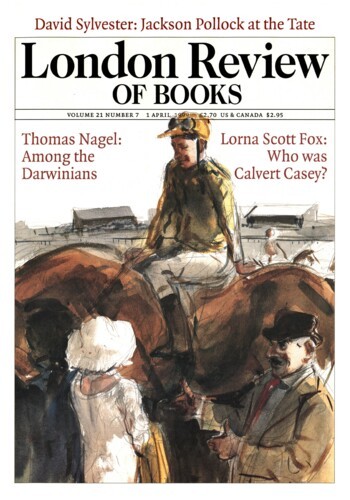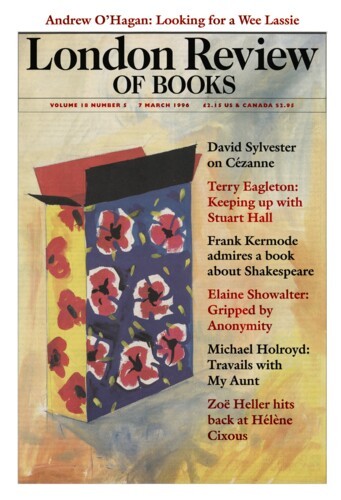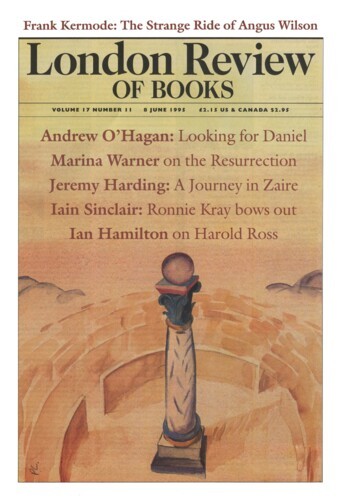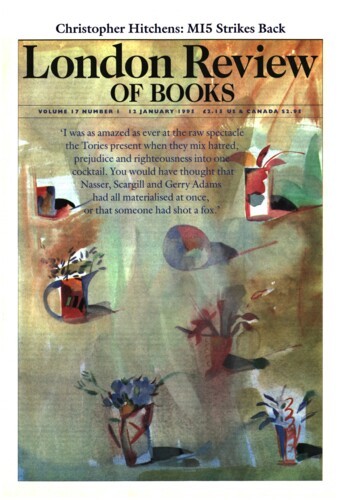David Sylvester
David Sylvester, who wrote many memorable pieces for this paper, died in 2001.
The Grin without the Cat: Jackson Pollock at the Tate
David Sylvester, 1 April 1999
In New York the Museum of Modern Art’s Pollock exhibition was thrilling in the manner of a saga. With exhilarating force it told the incident-packed story of an inspired and inspiring career cut off at 44 by a self-destructive death. It showed what confusion there was in the early development of a young artist of limited talent and uncertain direction. It demonstrated how he found within himself an intuition of the course he had to take, an uncharted course for which he was uniquely suited. It proved that by the time he was in his mid-thirties he had become a major artist who was opening up possibilities for a whole generation of painters, most of them older than himself, and then for a host of artists who came after. It displayed an extraordinary variety of formal invention and mood which nonetheless functioned inside the fairly narrow framework within which his peculiar talents were effective. It recorded a career fired by demonic energy, cosmic imagination, intense integrity, vast ambition and the physical intelligence of a great dancer or athlete. At the same time, it was an exhibition which affected the mind more than the viscera because of the unsuitability of the galleries housing it.
Notes on Cézanne
David Sylvester, 7 March 1996
‘Refaire Poussin sur nature’. Why did Cézanne single out Poussin when Rubens was his hero – his avowed and his manifest hero?’
The Real Magic
David Sylvester, 8 June 1995
I probably wouldn’t have chosen a work of criticism rather than Proust if the Bible and Shakespeare weren’t already there, but for some years now I have taken the view that my ‘Desert Island’ book, if I were asked, would have to be David Thomson’s A Biographical Dictionary of the Cinema. First published in 1970, it has just re-appeared as A Biographical Dictionary of Film in a third edition that is revised and considerably enlarged. Despite its titles it is indeed a work of criticism: ‘each of the thousand profiles,’ as the blurb says, ‘is a keenly perceptive, provocative critical essay.’
Under Wraps
12 January 1995
Pieces about David Sylvester in the LRB
Get out: Francis Bacon
Julian Bell, 19 October 2000
Somewhere in London, two heads would be nodding together: one tall like the boulder topping a cairn, the other broadened like a Hallowe’en pumpkin. Two lordly sensibilities, the...
Not His Type
Frank Kermode, 5 September 1996
In a preliminary chapter called ‘Curriculum Vitae’ David Sylvester explains that he became interested in art when, at 17, he was fascinated by a black and white reproduction of a...
Men at Work
Tom Lubbock, 12 January 1995
Personal witness has a peculiar status in the criticism of painting and sculpture, a status which it seems not to have in the criticism of other arts. There’s some feature of the visual...
Robbing banks
George Melly, 25 June 1992
Inspired by the bourgeois ‘bad taste’ of Magritte’s house in the Rue des Mimosas in suburban Brussels, Jonathan Miller took off into one of his self-intoxicating fantasies. We...
Bacon’s Furies
Robert Melville, 2 April 1981
In the preface to his new edition of montaged interviews with Francis Bacon, David Sylvester draws our attention to what has become the last section of the fifth interview. Altogether, there are...
Read anywhere with the London Review of Books app, available now from the App Store for Apple devices, Google Play for Android devices and Amazon for your Kindle Fire.
Sign up to our newsletter
For highlights from the latest issue, our archive and the blog, as well as news, events and exclusive promotions.




